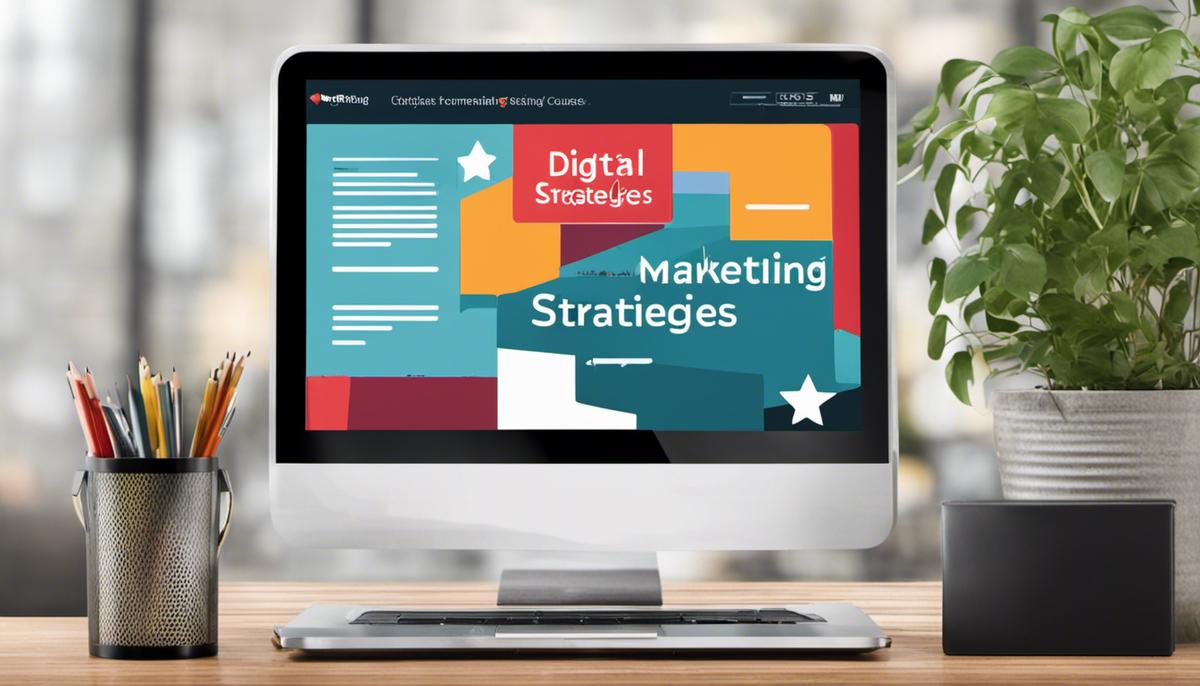BetterYouJourney.com is a participant in the Amazon Services LLC Some of the links in our posts are affiliate links. Click here to see full Disclosure.
In the ever-evolving digital world, crafting online courses and monetizing your knowledge has become a sustainable pursuit for many educators, thought leaders, and experts in various fields. This career crossover, combining elements of entrepreneurship and education, capitalizes on the need for continuous learning in today’s fast-paced society. Developing online courses for profit leverages not only your unique expertise and passion but also the powerful digital tools available at your disposal. This journey demands a deep understanding of the e-learning landscape, an introspection of one’s skills, careful compilation of course content, meticulous marketing strategies, and a plan for sustainability and growth.
Understanding the Concept: Online Course Creation for Profit
Creating and selling online courses
Creating and selling online courses have evolved into a profitable endeavor over the years, especially with the advancement of digital technology. With an effective planning and marketing strategy, educators can effectively transform their knowledge into income by using the e-learning platform.
Roles of educators and entrepreneurs
To start with, one must first grasp the intertwined roles of educators and entrepreneurs in the e-learning industry. In this scenario, the educators are not just providers of knowledge but also business owners who market and sell their courses to market niches.
Steps in creating an online course
The primary step in creating an online course is identifying one’s area of expertise. This is crucial in ensuring that the course delivers high-quality content that’s both valuable and unique. Once the topic is identified, the next step is to design the course. This involves creating a course outline, identifying learning objectives, and developing course materials, activities, and assessments.
Understanding the learners
An important aspect of online course creation is having a clear understanding of the learners. The course content should be tailored-to-fit the learners, meeting their needs and learning styles. This not only maximizes the learners’ engagement but also the overall success of the course.
Marketing online courses
Marketing is an equally important factor when it comes to selling online courses. Educators must employ effective marketing strategies in order to attract potential learners. These strategies could include content marketing, social media marketing, search engine optimization (SEO), or even email marketing.
Leveraging online learning platforms
One outstanding and effective strategy being used today is leveraging online learning platforms. Establishing a presence on one or more of these platforms, like Udemy or Coursera, not only increases the visibility of the course but also offers a secure and streamlined way for potential learners to purchase it.
Using personal website or blog
Beyond online learning platforms, another avenue for selling your courses can be your personal website or blog. This way, it’s easier to connect and interact with interested learners directly. A key part of this approach is developing an attractive and user-friendly website infrastructure that’s optimized for course transactions.
Considering the cost
While the income generated from the selling of the course is a vital aspect, it’s also important to consider the cost of production. The cost of creating and marketing an online course should be factored into the selling price.
Continuous innovation and evolution
Finally, the real deal about creating and selling online courses for profit is to continuously innovate and evolve. Not only should the learning content be updated to remain relevant, but the marketing strategies should also be improved and adapted to the changing trends in the e-learning industry.
Wrapping Up
As a concluding remark, the lucrative business of creating and selling online courses needs a sound comprehension of the multifaceted interaction between educators and entrepreneurs. It requires content of supreme quality and execution of impactful marketing strategies. Keeping these pivotal factors in mind sets the ground for a successful online course.

Identifying Your Potential: Harnessing Your Knowledge and Skills
Recognizing Your Specialized Skills and Expertise
Embarking on the journey of creating a rewarding online course begins with recognizing your specific skills and expertise. Every individual has something unique to share, and what might seem obvious to us can be complex for others. This disparity can be the basis for a potential online course.
Initiate by introspecting your life experiences, academic background, and acquired skills. Delve into various aspects of your life like hobbies, professional competence, or life skills that can offer value. For instance, if coding is your forte, a course on programming can be well-suited. If artistic skills are your strong suit, you could contemplate a course on digital art methods.
Choosing a Course Subject – Understanding Market Demand
Choosing a course subject that other people are interested in and willing to purchase is next. Carry out thorough market research to figure out what people in your field are interested in learning. There are various ways to do this, including conducting online surveys, interviews, or browsing through the trending subjects on existing course platforms.
You can narrow down the list of potential course topics based on both your personal interests and the market demand. Remember, the more passionate and knowledgeable you are about the topic, the better your course will be.
Balancing Passion and Expertise
Passion and expertise are two valuable components of a successful online course. Your passion will drive you through the course creation process, while your expertise will ensure that the course delivers value to your audience.
As you create your course, every detail, from the course description to the content delivery, should reflect the intense passion you have for the subject. However, sharing inaccurate or poorly researched information can damage your online reputation. So, it’s essential to back up your passion with solid expertise in the field. Remember, your goal is to provide your audience with useful skills they can apply in their daily lives or their chosen career path.
Quantifying Your Knowledge – The Foundation of Course Creation
When you have identified potential course topics, the next step is to quantify your knowledge. This involves breaking down what you know into digestible bits of information that you can communicate to your audience in a structured and understandable way.
Begin by using a mind map to brainstorm and visualize everything you know about the topic. From there, identify the key themes, skills, concepts, or problems that your course will address. This process will not only help you structure your course effectively, but it will also help you understand the extent of your knowledge and identify any gaps you may need to fill in to deliver a comprehensive course.
Structuring Your Online Course
Before you start creating your online course, it’s crucial to map out your expertise and organise it into a comprehensive outline. Illustrate the progression of your course, demonstrating how each module will contribute to achieving the primary learning goals. This structured approach will not only facilitate the creation process but also provide potential participants with a clear vision of what they will gain from your course.

Crafting Your Course: Compiling, Structuring, and Presenting Your Content
Identifying Your Target Audience
A vital step in crafting your effective online course is to understand your prospective learners thoroughly. Recognising your audience affects the decisions you make related to the course content, its organization, and the manner in which it’s presented. It’s important to ascertain what your learners want, what their existing knowledge base is, and how your course can bridge their knowledge gaps. By doing so, you increase the chances of producing a course that is both relevant and beneficial to your potential students.
Creating Your Syllabus
A well-structured syllabus is at the heart of every successful online course. It serves as a roadmap that guides your students through the learning journey. The syllabus should include a logical progression of topics, covering fundamental concepts first before moving onto more complex ideas. It should set clear expectations, including learning outcomes and the path to achieve them.
Incorporating Multimedia
Incorporating multimedia in your online courses can enhance learning and increase student engagement. Videos, images, audio material, and interactive elements can add depth to your instruction, bringing abstract ideas to life. Use slide presentations for theory lessons, videos for demonstrations, and interactive quizzes to reinforce learning. Remember to ensure each multimedia element has a role to play in the learning process and is not just included for entertainment purposes.
Making the Content Flexible for Different Learning Styles
People learn in different ways, so your online course should be flexible enough to cater to various learning styles. For visual learners, use diagrams, mind maps, and infographics. For auditory learners, incorporate more audio features. For kinesthetic learners, offer hands-on activities and interactive elements. Catering to different learning styles not only makes your course accessible to a broader audience but also improves the overall learning experience and outcome.
Presenting Your Course Content
When it comes to presenting your course content, clarity and organization are key. Break down your content into digestible chunks which are easier to understand and absorb. Each section of your course should focus on one key concept or skill. Be consistent with your formatting to make it easier for learners to navigate and follow along with your course. Use headings, subheadings, lists, and bullet points to organize your content.
Engaging Learners through Interaction
Engage your learners by making your online course interactive. This could be through discussions, quizzes, and other learning activities. Interactive elements give learners the chance to apply what they have learned, so they are not just passive recipients of information.
Ongoing Course Enhancement
To maintain a successful online course, it’s not sufficient to publish it and then ignore it. The material of your course needs ongoing review and improvements, which can be influenced by feedback from your students or developments in the subject matter. It is crucial to address queries and concerns swiftly and gain insight into any recurring issues or confusion that your students may be encountering. This way, you can keep refining your course and ensure it stays current and powerfully effective.

Digital Marketing Strategies: Promoting and Selling Your Course
Digital Marketing Techniques for Promoting Online Courses
The creation and sale of online courses can be a lucrative entrepreneurial initiative, granting subject-matter experts the chance to spread their wisdom globally. But to truly make your online course a victory, simply offering top-notch content is not enough. You also need to command the attention of the right audience. Here’s where effective digital marketing methods play a vital role. Understanding these techniques will pave the way to successfully connect potential students to your course.
Social Media as a Promoting Tool
Social media platforms can be a pivotal tool in promoting and selling your online courses. By leveraging the power of Facebook, Instagram, LinkedIn, TikTok, and other popular social platforms, you can create awareness for your online course to a global audience. These platforms allow for optimized targeted advertising, which can increase the exposure of your course to people interested in your subject matter.
Email Marketing and Your Online Course
Most successful online course creators swear by the power of email marketing. With a well-built, highly-engaged email list, you can leverage the power of direct communication with your audience to promote your course. Email nurture sequences, course launch announcements, and special promotions can all be done through your email list. Remember, the advantage of an email list over social media platforms is that you own your email list, and it isn’t affected by changes in social media algorithms.
Search Engine Optimization (SEO)
Search engine optimization (SEO) plays an important role in online course profitability. By optimizing your course description, landing page, and other course content using relevant keywords, you increase your chances of ranking higher in search engine results and getting found by potential students.
Content Marketing Strategy
Creating valuable content around your course topic helps to establish you as an authority in your field and attracts potential students. Blog posts, podcasts, YouTube videos, infographics, and e-books are some examples of content that can help attract those interested in your topic.
Pricing Your Online Course
Figuring out how to price your online course can be tricky. The price tag should reflect the value of the course material you provide but at the same time, it should also be accessible to your target audience. Competitive pricing analysis, understanding customer price sensitivity, and testing different price points can help you price your online courses to maximize profit while offering value to your students.
Other Promotional Tools
Other tools to promote your online course can include affiliate marketing, promotional partnerships, guest posting on blogs or podcasts related to your course topic, or discounts and bonuses to attract students.
Understanding how to effectively market your online courses with smart digital marketing strategies can be the difference between an unnoticed course and a highly successful online course business. In our current digital climate, these strategies are not just beneficial, they are essential for anyone looking to launch and run an online course.

Sustaining Success: Building a Loyal Learning Community and Evolving Your Course
Creating a Committed Learning Community
The key to a prosperous online course business lies within building a community of dedicated learners. This can be achieved by creating an engaging learning atmosphere and connecting learners through interactive activities. Fostering an environment where lively discussions and the exchange of ideas among students can occur not only within the course platform but also on social media platforms is a great way to enhance engagement.
Skilled course creators understand the importance of creating a sense of unity among their students. This can be done through regular feedback sessions, promoting opportunities for peer-to-peer learning, and offering group activities. An engaged learning community not only helps with the students’ learning experience – they can also turn into advocates for your course. They help expand the reach and potential revenue of your course by boosting its popularity.
Gather Feedback and Improve Your Course
Consistent improvement is an important aspect of sustaining success in online course creation. Gathering student feedback, evaluating course effectiveness, and making necessary changes can dramatically enhance the learning experience leading to higher student satisfaction and retention.
Course feedback can be sourced via surveys, email communications, student forums, or through the review features on course platforms. Key areas to consider for improvements may relate to course content, multimedia used, interaction methods, assessments, and course pacing.
Continuous Evolution
Online courses need constant updating and evolution to stay relevant and in-demand. Course creators should stay apprised of advancements and shifts in their subject matter, technology, and learning facilitation styles. Regularly updating course materials and incorporating the latest developments can boost a course’s competitiveness and attractiveness to learners.
Diversification & Upselling Strategies
Several successful course creators also maintain a diverse portfolio of courses. This allows them to cater to different student interests, learning levels, and affordability ranges, while also spreading their risk.
Upselling refers to inviting learners to purchase more expensive or advanced courses, related supplementary study materials, or coaching sessions once they’ve gained value and trust from an initial course. Done properly, upselling can greatly increase average revenue per student.
In Conclusion: Sustaining Success
In summary, sustaining success in creating and selling online courses requires a combination of strategies centered around a student-first approach. Building a strong learning community, being responsive to student feedback, continuously evolving course content, and employing smart upselling strategies can all contribute to the long-term success and profitability of an online course business.

By fully harnessing your unique knowledge, meticulously crafting impactful course content, employing strategic digital marketing, and striving for continuous growth and community building, it is more than possible to actualize the profitable creation and selling of online courses. As digital landscapes continue to transform, so do the methods and opportunities for sharing knowledge and making a profit. This rewarding endeavor of creating and selling your knowledge grants a chance not just to earn but more importantly, contribute to the education and enrichment of learners from all walks of life.








